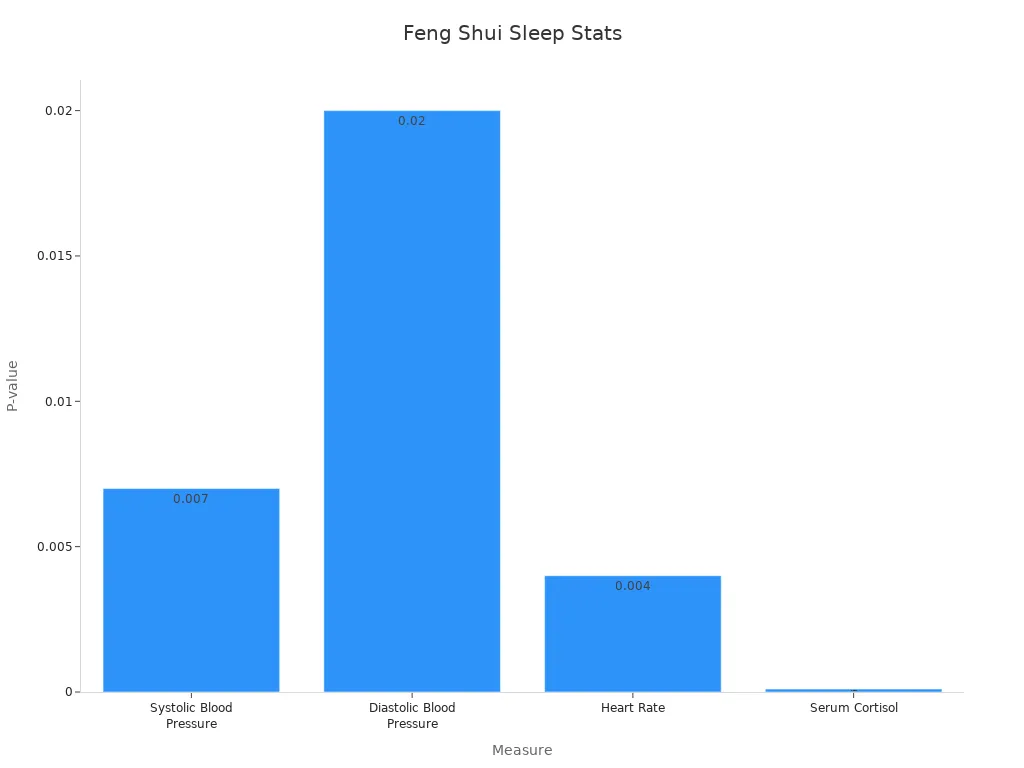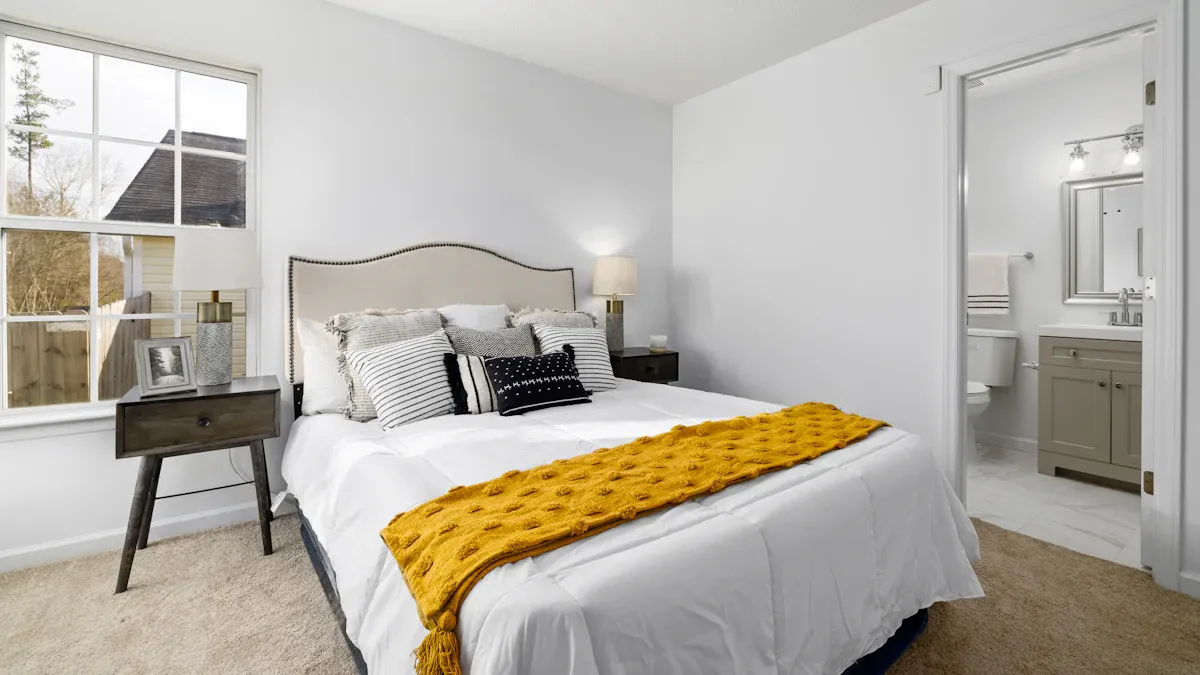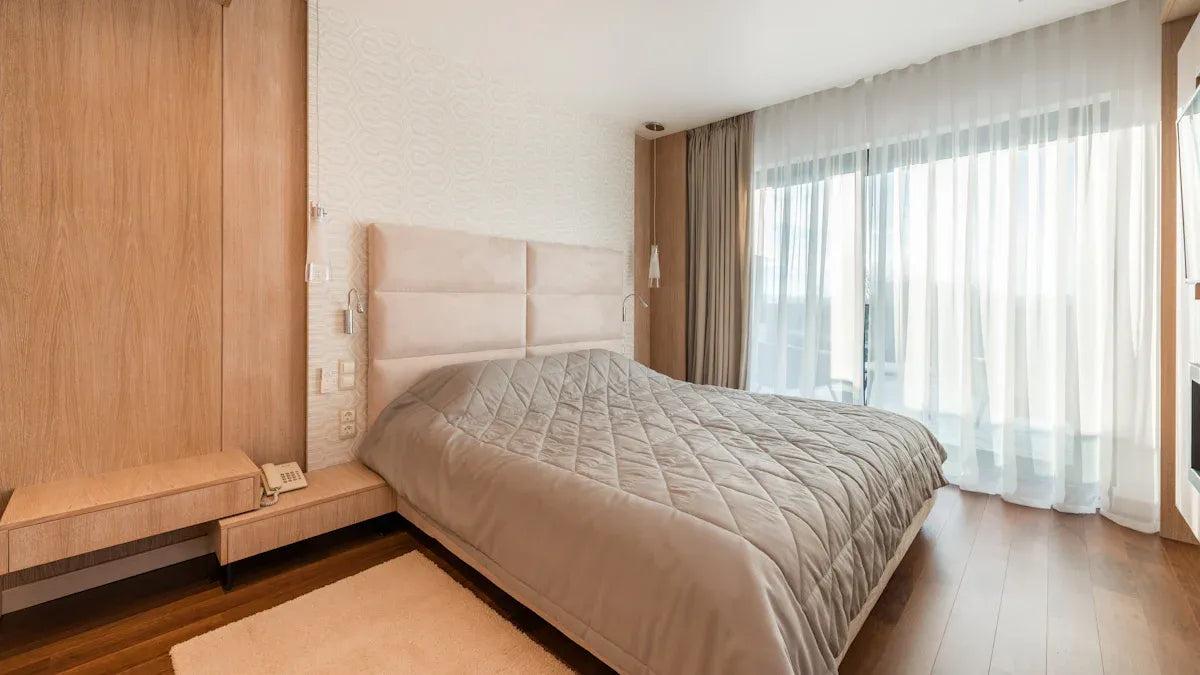Are you trying to make your bedroom feel better and sleep well? Many people want to know the best bed face direction for good feng shui. Studies say sleeping with your bed facing south or east can help your energy. It can also help you sleep better and may help your heart. Look at this chart from new research:

A feng shui bedroom with the right direction can bring good energy. This helps you sleep better and feel good. Every bedroom is different, so the best bed face direction depends on your room and what you need.
Measure |
Effect of Sleeping Direction Change (East/South vs West/North) |
Statistical Significance (p-value) |
|---|---|---|
Systolic Blood Pressure |
Went up when not facing East/South |
0.007 |
Diastolic Blood Pressure |
Went up a little |
0.02 |
Heart Rate |
Went up |
0.004 |
Serum Cortisol |
Went up |
0.0001 |
Tip: Good feng shui for your bed can really help your bedroom and energy flow.
Key Takeaways
Sleeping with your bed facing south or east helps your energy. It can make your sleep better and is good for your heart.
Put your bed in the commanding position. This means it should be across from the door, but not right in front. There should be a strong wall behind your bed. This makes you feel safe and supported.
Do not sleep with your head facing north or west. This can make you sleep badly and feel more stressed.
Use your Kua number to find your best sleeping directions. Your Kua number depends on your birth year and gender.
Try to keep your bed away from doors and windows. This helps stop drafts, loud sounds, and bright lights from bothering you.
Do not make mistakes like putting your bed feet toward the door. Do not sleep under beams or have mirrors facing your bed.
Small changes can help, like adding plants or using natural colors. Keeping your room clean also brings good energy and comfort.
Follow feng shui rules, but also think about what feels good to you. A calm and cozy bedroom helps you sleep better and feel happier.
Bed Face Direction Basics
Why Direction Matters
People often wonder why the direction of the bed matters so much in feng shui. Experts say that the way a bed faces can change the flow of energy, or "chi," in the room. This energy affects how someone sleeps, feels, and even how healthy they are. Architects and designers agree that bed arrangement is a big part of making a bedroom feel right. They often use feng shui sleeping direction ideas, not just because of tradition, but because these ideas help people rest better and feel safer.
Feng shui experts believe that the bed face direction shapes the energy around the sleeper. Good energy flow can bring restful sleep, better health, and even good luck. The best sleeping direction can also help protect against negative energy. Some people use their Kua number, which is based on birth year and gender, to find their personal optimal feng shui sleeping direction. But even without this, the main rules about direction help most people.
Note: The direction of the bed is not just about tradition. It can make a real difference in how someone feels every day.
South, East, and Other Options
Most feng shui guides say that the best sleeping direction is either south or east. These directions help the body and mind relax and recharge. Here are some reasons why these directions work well:
Feng Shui and Vastu Shastra both recommend sleeping with the head facing south. This is said to bring harmony, deep sleep, and positive energy.
East is another good choice. It supports focus, learning, and a calm mind.
Some studies show that sleeping with the head facing south or east can lower blood pressure and stress. People may wake up feeling more refreshed.
Animals like cows and deer often rest with their bodies along the north-south line, which suggests a natural preference.
Here is a table that shows the benefits of each direction:
Sleep Orientation |
Benefits (Feng Shui & Vastu) |
Scientific Insights |
|---|---|---|
South |
Deep, restful sleep; harmony; rejuvenation |
Lower blood pressure; less stress; better mental health |
East |
Calm mind; focus; meditative sleep |
Supports mental focus; some positive findings |
North |
Not recommended; disrupted energy |
Linked to poor sleep, higher heart rate, more stress |
West |
Not ideal; less harmony |
May raise heart rate and blood pressure |
People who want the optimal feng shui sleeping direction should try to place their bed so the head points south or east. These are the optimal bed directions for most people.
South: Best for deep sleep and feeling recharged.
East: Good for students or anyone who wants to boost focus and calmness.
Directions to Avoid
Some directions can cause problems with sleep and energy. Feng shui and Vastu experts warn against sleeping with the head facing north or west. Here’s why:
North-facing beds may disrupt the body's energy flow. Some believe this direction can cause headaches, restless sleep, and even higher blood pressure.
West-facing beds are also not ideal. People may feel less rested and more stressed.
Experts say that the Earth's magnetic pull in the north direction can make it harder for the body to relax at night. This is especially important for people with heart or blood pressure issues.
Tip: If someone cannot avoid a north or west direction, they can try using a solid headboard or heavy curtains to block negative energy.
Case studies show that sometimes, room shape or windows make it hard to follow the rules. In these cases, people can try different placements and see which one feels best. Feng shui sleeping direction is important, but comfort and room layout matter too.
Best Feng Shui Bed Placement

Commanding Position
The commanding position is a key idea in the best feng shui bed placement. In feng shui, this means putting the bed in the spot farthest from the door but not directly in line with it. The bed should face the door so the person can see who enters, but the bed should not line up with the doorway. This setup helps people feel safe and in control while they rest.
Here is a table that explains why the commanding position matters:
Aspect |
Explanation |
|---|---|
Commanding Position Definition |
The spot in a room furthest from the door but not directly aligned with it, allowing a wide view and clear sight of the door. |
Psychological Benefit |
Provides a subconscious sense of security and awareness by allowing visibility of the entrance. |
Bed Placement Recommendation |
Place the bed diagonally opposite the door with the backboard firmly against the wall to signify support. |
Symbolic Meaning |
Bed represents the self; placing it in commanding position enhances positive Qi flow related to personal well-being. |
Qi Flow and Fortune |
Proper placement enhances the flow of positive Qi, believed to improve good fortune in life aspects connected to the bed (self). |
Scientific Evidence |
No scientific proof exists; benefits are experiential, contributing to harmony and well-being. |
People often feel more relaxed when they can see the door from their bed. This bed position gives a sense of safety and helps the mind rest. The ideal bed position is usually diagonally across from the door, with the headboard against a solid wall.
Tip: If the room shape makes this hard, try to keep the bed out of direct line with the door and make sure you can see the entrance.
Solid Wall Support
A solid wall behind the bed is another important part of the best feng shui bed placement. Robert Lee, a feng shui expert, says that a bed should never "float" in the middle of the room. A wall behind the bed gives support and makes the sleeper feel safe. Even a false wall or a sturdy headboard can help if a real wall is not possible.
This support helps block out negative energy and gives a feeling of stability. People sleep better when they feel protected. Lee also suggests covering beams with a false ceiling or wall if they hang over the bed. This keeps the energy calm and steady.
A bed with a solid wall behind it feels anchored. The person sleeping there feels less exposed and more secure. This simple step can make a big difference in how restful the bedroom feels.
Avoiding Doors and Windows
Good bed placement means keeping the bed away from doors and windows when possible. Beds near doors or windows can let in drafts, noise, and too much light. These things can disturb sleep and make the room feel less private.
Here are some real-life ways people have solved bed placement problems:
In a small New York apartment, someone put a bed in front of a bay window. They used sheer curtains for privacy and storage drawers under the bed to save space.
In Tokyo, a bed sat against a window with city views. The owner added a noise-canceling headboard and blinds to block out sound and light.
A coastal bedroom had a bed in front of big windows facing the ocean. Blackout shades helped keep the room dark for sleep.
In a mountain home, a king-sized bed stood before a large window. Adjustable shades let the owners enjoy the view or block it for privacy.
Other tips for best feng shui bed placement include:
Place the bed with the head against a solid interior wall. This keeps out drafts and street noise.
Avoid putting the bed under beams or sloped ceilings. These features can make the bed feel heavy or uncomfortable.
Keep the bed out of direct line with the door. This helps the energy flow gently and keeps the sleeping area calm.
Use supportive furniture on both sides of the bed, like nightstands, to create a sense of shelter.
Feng shui experts say that the flow of energy, or Qi, should move gently around the bed. Beds should not face the door directly or sit between a door and window. This keeps the energy calm and helps people sleep better.
Note: Sometimes, room shape or windows make perfect placement hard. Try to balance comfort, privacy, and feng shui rules for the best results.
Feng Shui Sleeping Direction and Personalization
Kua Number Basics
Everyone has a unique energy pattern, and feng shui sleeping direction can work even better when it matches this personal energy. The Kua number is a simple tool from feng shui that helps people find their best sleeping direction. This number comes from a person’s birth year and gender. It shows which directions bring the most luck, health, and restful sleep.
Feng shui is not just about moving furniture. It is about making the bedroom fit each person’s needs. When someone uses their Kua number, they can choose a sleeping direction that matches their energy. This can help the bed feel more comfortable and the room feel peaceful. Many people notice better sleep and more positive energy when they use personalized feng shui sleeping direction tips.
Feng shui experts say that everyone’s energy is different. Personalized changes, like picking the right bed direction or using certain colors, can make a big difference. These changes help balance the energy in the bedroom. People often feel calmer, sleep better, and wake up with more energy.
How to Calculate Kua Number
Finding your Kua number is easy. Anyone can do it with a few quick steps. Here is a simple guide:
-
Take the last two digits of your birth year and add them together. If the result is a double-digit number, add those digits again to get a single digit.
Example: 1991 → 9 + 1 = 10 → 1 + 0 = 1
-
For females: Add 5 to the single-digit number. If the result is double-digit, add those digits again to get a single digit.
Example: 1 + 5 = 6
-
For males: Subtract the single-digit number from 10.
Example: 10 - 1 = 9
The final number is your Kua number.
This number helps people find their best feng shui sleeping direction. It is a quick way to make the bedroom feel more balanced and restful.
Tip: Write down your Kua number and keep it handy. You will use it to pick the best sleeping direction for your bed.
Matching Kua Number to Bed Direction
Once someone knows their Kua number, they can use it to find the best sleeping direction. Each Kua number has lucky directions that help with sleep, health, and happiness. People with different Kua numbers may need to face their bed in different ways.
Here is a simple table to match Kua numbers and sleeping direction:
Kua Number |
Best Sleeping Directions |
What It Helps |
|---|---|---|
1, 3, 4, 9 |
East, Southeast, South, North |
Good health, growth, calm sleep |
2, 6, 7, 8 |
West, Southwest, Northwest, Northeast |
Harmony, support, deep rest |
People should try to place their bed so their head points toward one of their lucky directions. This helps the energy flow in the bedroom match their personal needs. Feng shui sleeping direction works best when it fits both the room and the person.
Personalized feng shui adjustments, like using the Kua number, can make the bedroom feel more peaceful. Studies show that these changes help people sleep better and feel happier. Feng shui sleeping direction is not one-size-fits-all. It is about finding what works for each person and their space.
Bed Placement and Room Layout

Measuring Directions
Getting the right direction for the bed can feel tricky, but it does not have to be. Many people use a simple compass app on their phone to check which way their bedroom faces. Place the phone flat on the bed and see where the headboard points. This helps find the best direction for sleep and energy flow.
Studies show that measuring directions in a room is not just a tradition. Researchers have compared feng shui with environmental psychology and sustainable design. They found that some feng shui ideas match what makes people feel comfortable and happy in a space. One study even used special tools to measure the energy field around the body in different directions. The results showed that certain directions can help people feel better, both physically and mentally.
Tip: Always double-check the direction before moving heavy furniture. A small change can make a big difference in how the bedroom feels.
Working with Room Constraints
Not every bedroom is perfect. Sometimes, windows, doors, or built-in closets make bed placement hard. Designers and homeowners often face these problems. A recent study used computer models to test different layouts. The results showed that it is possible to balance feng shui rules with real-life needs.
Here are some ways to work with tricky rooms:
Try placing the bed so the head is near a solid wall, even if it is not the ideal direction.
Use a sturdy headboard if the bed must go under a window.
Add curtains or screens to block out light and noise.
Move nightstands or small furniture to create a sense of balance.
A table can help compare options:
Room Problem |
Feng Shui Solution |
|---|---|
Window behind bed |
Use thick curtains and headboard |
Bed faces door |
Place a bench or rug at the foot |
Odd-shaped room |
Angle the bed for best direction |
These ideas help people get good energy in the bedroom, even when the layout is not perfect.
Small Spaces and Built-Ins
Small bedrooms and built-in features can make bed placement feel impossible. Feng shui experts and architects have found creative ways to solve these problems.
Some cities use feng shui with smart design to make small spaces feel bigger and more balanced.
In places like Beijing and Hangzhou, designers match energy flow with things like light and air to help people feel good in tight spaces.
Experts say that air, water, light, color, and sound all matter. Good air flow and natural light can make a small bedroom feel calm.
In big buildings, designers sometimes add water features or special lighting to fix energy problems from built-in walls or odd shapes.
Interviews with feng shui masters show that even in tiny apartments, people can use layout, color, and sound to improve energy.
Note: Even a small change, like moving the bed a few inches or adding a plant, can help the bedroom feel more peaceful.
People do not need a perfect room to enjoy good feng shui. With a little creativity, anyone can find a bed placement that works for their space and brings better sleep.
Good Feng Shui Tips and Common Mistakes
Common Bed Placement Errors
Many people want good feng shui in their bedroom, but some common mistakes can block good energy flow. Here are some errors that often happen:
Placing the bed so the feet point straight at the door. This is called the "corpse position" and is believed to drain energy, leaving people tired or stressed.
Pushing one side of the bed against a wall. This setup can make a bedroom feel unbalanced and may cause problems in relationships.
Sleeping under beams or heavy chandeliers. These features can create a feeling of pressure and may even lead to headaches or restless nights.
Using a metal or open headboard. Without solid support, people may not feel safe or protected while sleeping.
Letting clutter pile up around the bed. Messy spaces block good feng shui and can make it hard to relax.
Placing mirrors so they reflect the bed. Experts say mirrors can bounce energy around, causing restlessness and even disturbing dreams. Some people feel watched, which can increase anxiety at night.
Tip: Good feng shui starts with a tidy, balanced bedroom and a bed that feels safe and supported.
Quick Fixes for Bad Layouts
Not every bedroom has the perfect shape or space, but small changes can help. Here are some quick fixes for common problems:
If the bed faces the door, place a bench or rug at the foot of the bed. This helps slow down energy and makes the room feel safer.
For beds under windows, use thick curtains and a sturdy headboard. These add support and block out unwanted energy.
If a mirror faces the bed, move it or cover it at night. This simple step can help people sleep better and feel calmer.
When space is tight, try angling the bed or using screens to create a sense of privacy.
Clear away clutter from under and around the bed. A clean space invites good energy flow and helps with restful sleeping.
A table can help show these quick solutions:
Problem |
Quick Fix |
|---|---|
Bed faces door |
Add bench or rug at foot |
Bed under window |
Use curtains and headboard |
Mirror faces bed |
Move or cover mirror |
Clutter in bedroom |
Clean and organize |
Add nightstand for balance |
Balancing Feng Shui and Comfort
Good feng shui should always work with comfort. Studies show that when people use feng shui tips, they feel less anxious and enjoy their bedroom more. In one study, people felt calmer and more supported when the bed had a solid headboard and was placed away from negative energy sources. The room felt more pleasant, and people slept better.
A comfortable bedroom helps people relax and recharge. Feng shui works best when it fits real life. If a rule feels too strict or makes the room less cozy, it is okay to adjust. The most important thing is to create a space that feels peaceful and supports good sleeping habits.
Note: Good feng shui is about balance. A bedroom should feel safe, comfortable, and full of good energy flow. Try different layouts and see what feels best.
Creating Your Feng Shui Bedroom Plan
Step-by-Step Action Plan
Anyone can create a peaceful bedroom with a few simple steps. Experts suggest starting with the basics and building from there. Here’s a clear plan to follow:
Place the bed so the headboard rests against a solid wall. This gives a sense of support and safety.
Position the bed diagonally across from the door, but avoid having your feet point straight at the entrance. This setup helps people feel secure and in control.
Make sure you can see the door from the bed. This small change can help the mind relax.
Choose a larger bed and mattress if possible. More space means better rest.
Add matching bedside tables on both sides of the bed. Wood tables bring in a natural touch and create balance.
Keep mirrors out of sight from the bed. Place them where they reflect light but not the sleeping area.
Let in fresh air and natural light during the day. Open windows or draw curtains to boost energy and improve sleep.
Use indoor plants, like a Jade plant, to bring in fresh energy and a touch of nature.
Pick bedding made from natural materials, such as cotton or bamboo, for comfort and good energy flow.
Remove electronics and screens from the bedroom. Less blue light means better sleep.
Choose soft, calming colors for walls and bedding. Skin tones and gentle browns work well.
Keep the room tidy. Clear away clutter to help energy move smoothly and reduce stress.
Avoid placing the bed under low beams or near water features. These spots can disrupt sleep and energy.
Tip: Even small changes, like moving a nightstand or adding a plant, can make a big difference in how the room feels.
Adjusting and Experimenting
Every bedroom is unique. Sometimes, the perfect layout is not possible. People can try different setups to see what feels best. If the bed cannot face the ideal direction, they can use a sturdy headboard or add curtains for extra support. Moving the bed a few inches or changing the position of a mirror can shift the energy in the room.
Some people find that adding artwork or soft lighting helps create a peaceful mood. Others notice that removing clutter or using natural scents, like lavender, makes it easier to relax. The key is to pay attention to how the room feels after each change. If sleep improves or the space feels calmer, the new setup is working.
Note: There is no single right answer. What matters most is finding a layout that brings comfort and harmony.
Final Thoughts
A good feng shui bedroom plan does not have to be complicated. By following a simple action plan and making small adjustments, anyone can create a space that supports restful sleep and positive energy. Trying different layouts and paying attention to comfort helps people find what works best for them. With a little effort, the bedroom can become a true retreat—a place to recharge and feel at peace.
A feng shui bedroom can help bring good energy. It can also help people feel relaxed and peaceful. Experts say south and east are the best sleeping directions. But every bedroom is not the same. Some people feel better when their bed matches their own energy. Others like to fit the bed to the room’s shape. Studies show that both animals and people react to direction. So, it is smart to try what feels best for you. People should test different feng shui setups and focus on comfort. A calm bedroom gives more good energy and helps people sleep well.
FAQ
What if someone cannot place their bed facing south or east?
People can try their best to follow feng shui rules, but comfort matters most. If the bed cannot face south or east, they should use a solid headboard and keep the space tidy. These steps help balance the energy.
Does feng shui work in small bedrooms?
Yes! Feng shui works in any size room. People can use simple tricks like adding plants, using soft colors, or moving the bed a few inches. Even small changes can make a big difference in how the room feels.
Can someone use a mirror in the bedroom?
Feng shui experts say mirrors should not face the bed. If a mirror reflects the bed, it may disturb sleep. People can move the mirror or cover it at night for better rest.
Is it bad to have the bed under a window?
A bed under a window is not ideal in feng shui. If this cannot be avoided, thick curtains and a sturdy headboard help block unwanted energy. This setup gives more support and privacy.
How does someone find the direction their bed faces?
A person can use a compass app on their phone. Place the phone flat on the bed and check where the headboard points. This shows the bed’s direction.
Do colors in the bedroom affect feng shui?
Yes, colors matter. Soft, natural colors like beige, light brown, or pale green help create a calm space. Bright or dark colors may feel too strong for restful sleep.
Can two people with different Kua numbers share a bed?
Yes, they can. Couples often pick a direction that supports both people’s health or happiness. If that is not possible, comfort and good sleep should come first.










